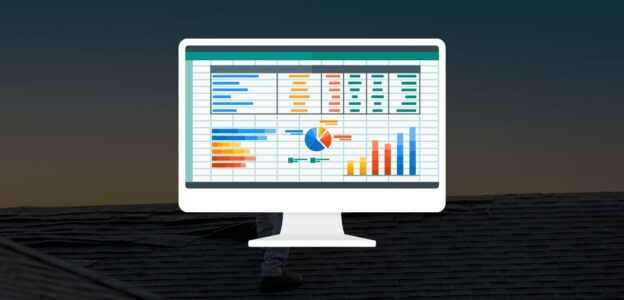The right software can change how you work and interact with your customers as a contractor. In the construction industry, specialized cloud-based contractor client management software simplifies complex projects and preserves client satisfaction. Strong client-contractor relationships are essential for successful tradespeople, as they contribute to repeat business, positive word-of-mouth, and excellent reviews — all critical factors in ensuring a continuous influx of work.
Table of Contents
ToggleThe Significance of Contractor Software for Client Relationship
Client relationship software plays a pivotal role in managing interactions within a construction business. It serves as a detailed archive of communications with past, present, and future clients. It functions as a comprehensive repository, recording every client interaction to make each client feel acknowledged and valued.
Without such a contractor client management system, a business might focus too heavily on recent engagements, neglecting long-established relationships and the systematic follow-up processes essential for ongoing growth. This could result in missed opportunities and a fragmented approach to client management.
Integrating a client relationship system with robust project management capabilities offers a comprehensive solution beyond simple client tracking. This unified system not only streamlines client interactions but also covers the entire project lifecycle, from the initial engagement to project completion and follow-up, establishing a foundation for an effective, client-centered operation.

Additional features of this software include:
- Client Portals: These portals allow clients to view project progress, communicate with teams, and manage payments, which enhances transparency and client satisfaction.
- Service Tickets: Efficient service ticket management ensures that client issues are resolved quickly, improving service quality and responsiveness.
- Document Management: A superior software system manages documents such as blueprints and contracts, providing easy access to facilitate exceptional project management.
- Mobile Access: Since construction teams often need to be mobile or onsite, having a mobile app or mobile-friendly access is essential. This enables team members to update and retrieve information from any location.
- Workflow Automation: Automation of repetitive tasks like follow-ups, billing reminders, and status updates not only saves time but also minimizes errors, allowing the team to concentrate on more crucial aspects of their projects.
- Communication Tools: Built-in client communication tools, such as email, messaging, and possibly VoIP calls, help maintain consistent communication with clients and within the team.
- Reporting and Analytics: Advanced tools to monitor performance metrics, sales forecasts, project profitability, and customer satisfaction are critical for making informed business decisions.
- Integration Capabilities: The CRM should integrate seamlessly with other systems the construction company uses, such as accounting software and specialized construction management tools.
- Compliance and Security: The CRM must adhere to industry standards and regulations, particularly concerning data protection, to maintain client trust and avoid legal complications.
This robust software infrastructure is essential for any construction business aiming to maintain high standards of client management and operational efficiency.
How Does a Contractor Software Helps Build Client Relationship

1. Centralized Data
Construction management software is a pivotal hub for customer-related data, making it a cornerstone for enhancing operational efficiency and client satisfaction in the construction sector. This software centralizes critical data such as client interactions, project details, feedback, and historical records. Such centralization not only simplifies the accessibility of information, reducing errors and improving data consistency but also enhances collaboration among teams. This unified approach ensures all team members have real-time access to the latest project data, enabling better communication and more efficient decision-making.
Plus, a centralized data system supports personalized customer service, allowing companies to respond swiftly to client inquiries and resolve issues effectively, which is crucial for maintaining positive client relationships and ensuring project success. The integrated data also aids in streamlined project management, efficiently managing budgeting and scheduling under one system, reducing redundancy and enhancing productivity.
2. Improved Communication
One immediate benefit of using construction management software is the enhanced communication flexibility among all stakeholders. Whether staff are in the office or at the job site, the software maintains constant connectivity. This adaptability allows for the swift transmission of change orders and incidents and the exchange of documents and data.
Ineffective communication can lead to high costs, client misunderstandings, and project delays. With readily available information, keeping clients informed becomes straightforward.
Additionally, construction management software dramatically reduces the risk of communication failures that can cause expensive delays and client misunderstandings. A centralized system provides all stakeholders with client communication tools and a quick access to essential information, supporting faster decision-making and improving overall project management. By improving communication efficiency, the software not only boosts project productivity but also aids in keeping clients satisfied by ensuring they are well informed throughout the project.
Real-time collaboration features are incredibly beneficial, enabling team members to communicate immediately and access up-to-date project information, thus reducing potential delays and enhancing responses to emerging issues.
3. Consistent Estimations
Estimations that need to be more specific or correct can lead to client disputes. Traditional manual methods often require more accuracy due to outdated data and human error. These mistakes can escalate into conflicts when there is a large discrepancy between initial estimates and final costs. Construction estimating software enables companies to quickly create detailed and precise bids, improving productivity and enhancing client trust.
This contractor client management software improves the accuracy of project bids by automating calculations and using current data. It works well with other project management tools, ensuring that estimates are always based on the most recent information, including material costs and labor rates that frequently fluctuate due to market conditions.
With construction software, the estimating process is refined, producing detailed bids and calculating the project’s scope swiftly and accurately.
4. Accurate Cost Management

Cost management is another potential source of conflict between project managers and clients. To maintain credibility with financial partners and clients, contractors must accurately predict project costs and outcomes. Construction management software provides the visibility needed to compare actual and budgeted costs.
This software enhances cost management by offering features that simplify estimating, tracking, and controlling project costs.
Contractors gain access to real-time financial data using construction management software, allowing them to compare actual expenses against budgeted amounts effectively. This real-time insight is essential for promptly identifying and managing cost variances, helping maintain budget discipline, and preventing financial overruns. The software aids in making informed decisions by providing detailed insights into every project’s financial aspect, from initial estimates to final expenditures.
Additionally, integrated cost management systems within these software platforms centralize all cost-related activities. This centralization involves automating and optimizing workflows such as change orders, payment applications, and contract management, thus minimizing the risk of errors and miscommunication. The ability to update and access real-time data ensures that all stakeholders are informed and can respond quickly to any changes, improving construction projects’ overall efficiency and profitability.
5. Streamlined Operations
Construction management software enhances visibility over work orders and daily operations, resulting in timely project completion. It manages work orders comprehensively, maintaining all related documentation, change orders, and reports. This management saves time and costs, improving client relationships by avoiding project delays and minimizing human error.
The software improves operations within the construction industry by enhancing daily project management and oversight. It is designed to handle everything from initial work orders to comprehensive project documentation and reporting, ensuring efficient management from start to finish.
6. Detailed Project and Equipment Management

Effective project and equipment management is crucial for maintaining construction schedules and controlling costs—and the saying is true, “the more you save, the more you provide.” Construction project management software dramatically enhances the capability to monitor project progress and equipment use. It offers comprehensive insights into project timelines, enabling managers to quickly identify delays or inefficiencies and adjust to keep projects on schedule.
Construction equipment management is deeply integrated into these systems, providing features that track equipment locations, usage, and maintenance schedules. Managers can ensure equipment is used and maintained effectively, preventing project delays and reducing equipment downtime or repair costs. Furthermore, this integration allows for the rapid reassignment of equipment to different locations as needed by the project, thereby improving operational efficiency.
7. Streamlined Payment Processing
Using specialized software to create and send invoices helps improve client relationship management by automating the invoicing process. This automation enhances accuracy and reduces errors that could harm client relationships. Issuing detailed invoices quickly after services are rendered demonstrates professionalism and reliability, key elements in establishing trust with clients.
Invoicing software typically includes payment gateway features that speed up the payment process, improve cash flow, and reduce delays associated with traditional payment methods. When clients receive straightforward, professional invoices and can make payments conveniently, it reduces the likelihood of disputes and increases client satisfaction. Additionally, this software helps keep organized records of all transactions, which are vital for maintaining transparency and accountability.
8. Enhanced Service Delivery
Software improves service delivery in construction and other service-oriented sectors by making project management more efficient from start to finish. These systems facilitate effective tracking and management of every phase of service delivery, and managing client expectations.
Integrating these systems provides deep insights into customer behaviors and project details, enabling businesses to tailor services more closely to client needs. Access to real-time data and performance metrics allows businesses to make knowledgeable decisions that improve service quality and increase client satisfaction.
9. Improved Issue Resolution
Contractor software is essential for efficiently resolving customer issues. Features like automated ticketing systems and knowledge bases ensure that customer inquiries are handled quickly and effectively. The software also includes capabilities for tracking issue status, automating workflows, and escalating problems when needed, which improves the support team’s overall efficiency.
Fast and effective resolution of customer concerns is crucial for maintaining positive customer relationships and satisfaction. The integration of this software provides a comprehensive view of customer interactions across sales and support, enabling personalized service and more effective problem-solving.
Conclusion
Cloud-based contractor software can significantly enhance how construction firms manage projects and client relationships. This software streamlines operations and reduces errors by centralizing data, improving communication, and ensuring accurate estimations. Enhanced cost management and detailed project tracking lead to better financial control and timely project completion.
Automated invoicing and real-time collaboration further improve client satisfaction. Effective issue resolution features swiftly address customer concerns, maintaining strong client relationships. Ultimately, the right contractor software provides a comprehensive solution for managing complex construction projects and fostering long-term client loyalty, which is essential for sustained business growth and success in the competitive construction industry.
Frequently Asked Questions
Contractor software often includes a client portal that provides real-time access to estimates, invoices, work orders, and progress photos. This transparency keeps clients informed and involved, building trust and satisfaction.
Contractor software enables clear communication through updates, direct messaging, and email or mobile notifications integration. This keeps the contractor and client informed about project status, changes, and issues, reducing misunderstandings.
Contractor software manages client expectations by providing detailed project information, timelines, and budgets. Real-time tracking, scheduled updates, and visual progress reports inform clients about project transparency and compliance.
Contractor software fosters long-term relationships by involving clients through shared platforms and tools. Personalizing interactions, engaging in meaningful dialogue about project goals, and managing client expectations help build strong client relationships.

